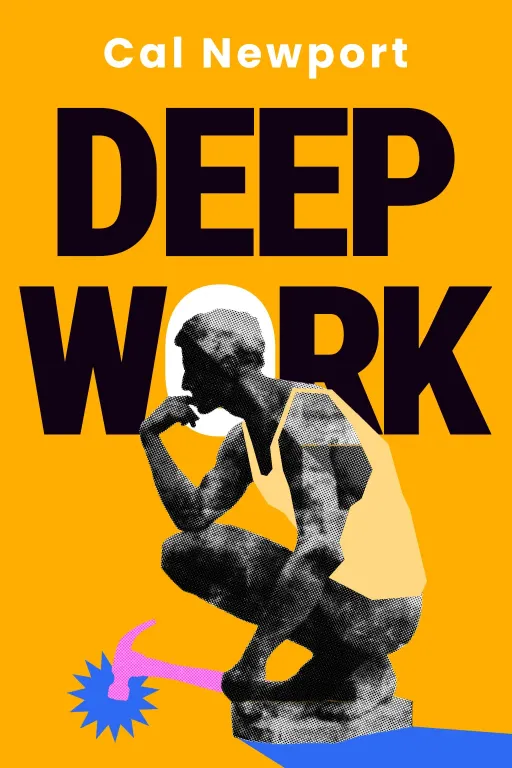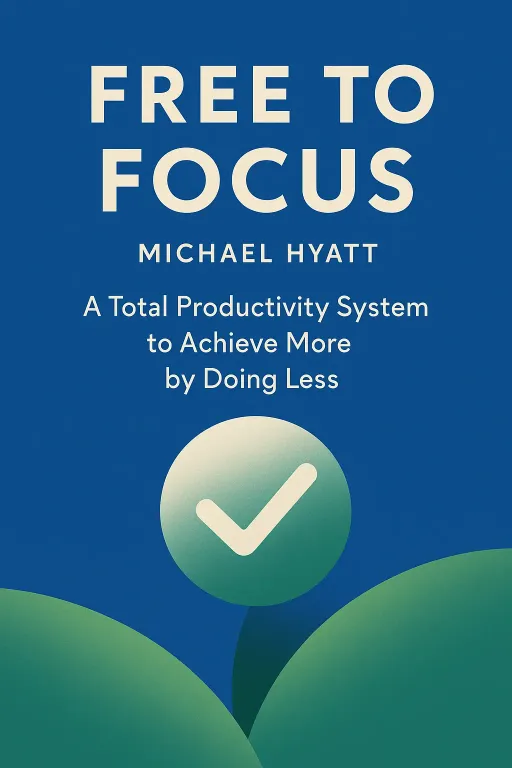
Deep Work
Productivity
Cal Newport
Deep Work: A Synthesis of Focused Productivity and Intellectual Flourishing
This treatise meticulously dissects the concept of "deep work," defining it as the focused, uninterrupted engagement with cognitively demanding tasks to maximize productivity and creativity. It posits that in our contemporary society, characterized by an unprecedented influx of digital distractions and the ubiquity of technology, the ability to cultivate deep work is not merely advantageous but constitutes a sine qua non for both professional success and personal fulfillment. By elucidating the dichotomy between deep work and its antithetical counterpart, "shallow work," and rigorously examining supporting evidence from neuroscience, psychology, and philosophy, the text endeavors to demonstrate how the cultivation of depth can lead to extraordinary professional achievements and a profound sense of personal meaning. In essence, it serves as a pragmatic guide replete with actionable strategies and precepts designed to systematically foster deep work habits while concurrently minimizing distractions, thereby enabling readers to attain elite levels of productivity and creativity.
The Dichotomy of Deep and Shallow Work: Navigating the Attentional Landscape
In an era defined by relentless distractions and perpetual interruptions, the concept of "deep work" emerges as a critical paradigm for those aspiring to optimize their productivity and intellectual capacity. Defined as a state of intense, distraction-free concentration during professional activities to push one's cognitive limits, deep work presents a stark contrast to "shallow work." Shallow work, conversely, encompasses tasks that are inherently less cognitively demanding and are frequently performed amid distractions, such as responding to emails or perusing social media platforms. As our contemporary economy becomes increasingly intertwined with technology and susceptible to manifold distractions, the aptitude to engage in deep work takes on an unprecedented significance, becoming an indispensable skill for navigating the complexities of modern professional life.
Our lives have become intricately interwoven with digital connectivity, which presents an ever-escalating challenge to maintaining focus. Distractions lurk pervasively, poised to disrupt cognitive flow and fragment attention spans. Thus, the exploration of the power and necessity of deep work underscores the imperative of cultivating this skill, vital for achieving our highest potential and making consequential contributions within our respective fields. The deliberate and intensive effort of engaging in deep work not only augments productivity but also facilitates a deeper sense of purpose and gratification in our professional endeavors.
The nature of work has undergone a seismic transformation; the accelerated evolution of technology dictates that traditional methods of achievement may no longer be sufficient. In a milieu where information is ubiquitous, the ability to concentrate deeply and work creatively in synergy with intelligent machines becomes paramount. Embracing deep work equips individuals with the necessary tools to distinguish themselves amid a sea of distractions, laying a robust foundation for sustained success and a more enriching work experience.
A notable historical figure who exemplified the potent efficacy of deep work was Carl Jung. In 1922, he established a secluded retreat in the Swiss village of Bollingen to cultivate an environment conducive to concentrated thought and creativity. This deliberate isolation allowed Jung to transcend the habitual pace of urban life, dedicating his time to the focused pursuit of his intellectual inquiries into the nature of the unconscious. Through deep work, he not only contributed substantially to the field of psychiatry but also evolved his understanding of psychoanalysis while simultaneously developing a new school of thought: analytical psychology. Jung's unwavering commitment to deep work indelibly marked his career, forging his path to enduring influence as one of the leading intellectual figures of the twentieth century.
The Deep Work Hypothesis: A Clarion Call for Focused Expertise
In this rapidly evolving digital epoch, the capacity to engage in deep work has become indispensable for achieving mastery over complex undertakings and producing outputs of exceptional quality. Defined as professional activities undertaken in a state of distraction-free concentration that stretches cognitive capabilities to their limits, deep work ultimately leads to the creation of new value and the enhancement of existing skills. The essence of deep work lies in its inherent necessity; as we strive to maximize our intellectual potential, the profound mental engagement that characterizes this endeavor must counterbalance the pervasive distractions endemic to our daily lives.
Consider the compelling example of Jason Benn, a former financial consultant who metamorphosed into a skilled computer programmer. His awakening to the struggles faced by contemporary workers with concentration and distractions catalyzed a transformational shift toward embracing deep work. Benn's epiphany regarding his diminishing value in an environment where routine tasks could be automated led him to seek profound skills in programming, illustrating persuasively how deep learning and focused work can lead to significant career advancement. By immersing himself in distraction-free environments, he unlocked a renewed level of productivity, enabling him to thrive amidst formidable competition in his field.
These illustrative examples highlight that the shift toward deep work manifests as a distinctly definable economic opportunity. In a landscape poised for transformation, those who can optimize their deep work abilities will set themselves apart as industry leaders. The collective narrative underscores a compelling truth: committing to deep work is not merely a nostalgic nod to past methodologies but a critical undertaking that fosters innovation, propels personal growth, and elevates careers in an increasingly competitive global economy. In doing so, we recognize the emerging importance of the deep work hypothesis—a clarion call to develop this vital skill set in a world clamoring for true, focused expertise.
The importance of deep work is reinforced by psychological and neurological insights. The exploration of the intricate relationship between attention and cognitive development reveals a more profound understanding through the lens of myelinization of neurons. Daniel Coyle's research illuminates that enhancing cognitive abilities is not simply about practice; it is profoundly linked to the biological processes within our brains. As individuals undertake focused practice, layers of myelin build around neurons associated with specific skills, allowing circuits to fire more efficiently. As Coyle succinctly argues, "To learn hard things quickly, you must focus intensely without distraction." This principle underlies the importance of fostering flow states and minimizing distractions in the cultivation of deep work.
Philosophies of Depth: Tailoring Approaches to Individual Needs
Navigating the implementation of deep work requires an understanding of depth philosophies. These strategies range from the monastic which prioritizes full isolation, to the more flexible rhythmic, journalistic, and lasting fit philosophies. The monastic approach, epitomized by figures like Donald Knuth and Neal Stephenson, underscores a complete severance from distractions to maximize focus on complex tasks. However, the rigid singularity of the monastic method may not suit individuals whose roles demand varied collaboration and sustained interactions.
Alternatively, the rhythmic philosophy fosters a practical integration of intervals dedicated to deep work amid the ordinary chaos of daily life. Whether an hour each morning or an afternoon each week, these established blocks create consistency and allow individuals to transition quickly into concentrated productivity. Additionally, those who implement this strategy effectively can produce high-quality work while meeting the pressing demands of their profession. Finally, the lasting fit philosophy serves as a fluid method by supporting the implementation of deep work amid shifting needs by allowing constant assessment and responsiveness to the environment. Recognizing the individual demands that may hinder the traditional paths, it highlights the importance of fluidity in a chaotic environment.
Navigating the path to greater productivity is to balance the need for focus alongside the necessity of adaptability. Ultimately, whether pursuing the monastic, rhythmic, journalistic, or hard philosophy, these approaches should be based on personal and professional environments to cultivate meaningful and focused work.
Adopting Deep Work: Philosophies and Strategies
To cultivate a rich, focused mindset, a variety of "depth philosophies" were explored. Ranging from intense isolation, known as the monastic, to the bimodal, rhythmic, and journalistic, one recognizes that the path toward deep work and productivity requires individual optimization. Carl Jung exemplified a bimodal implementation by dividing his time between dedicated study and time spent interacting with the world. Moreover, Walter Isaacson implemented the journalistic methodology by interspersing creative work amid a fast-paced environment. Regardless the approach, intentional selection and structure allow individuals to maximize their potential for deep work and cultivate a transformation of their lifestyle. Ultimately, the practice of deep work is not simply about productivity; it can profoundly transform one's ability to grow and cultivate a richer, more fulfilled professional life through deep, meaningful engagement.
Distraction and Decline
In an age of digital saturation, individuals now navigate a landscape rife with distraction, forcing cognitive function to decline as they struggle to adapt. By exploring the cultural environment and its impact, such as in open-concept plans, technology-filled communications patterns, and the role of social media, it is illuminated that there is now a barrier to deep focus. As technology distracts, it sacrifices deep engagement because the modern work environment prioritizes communication over focus.
Managing these problems is a journey requiring the implementation of filters that promote quality amid the haste of digital engagement. The modern world must, instead, highlight and define that deep engagement is as essential as productivity within the professional setting.
Deep Work as Craftsmanship
With modern society now influenced by the presence of social media and demands for shallow work, the concept of deep focus can feel like a long-lost art. However, deep work, a practice centered on focused discipline, mirrors those commonly employed in blacksmithing and other traditional crafts. This is profoundly illuminated with craft examples like Ric Furrer's hand-forging practice. With his approach, the beauty and fulfillment are tied together through intentional connection and his reinforcement provides purpose through a dedication rarely found. By combining the mastery, intentionality, and focused immersion, the result is a labor of deep commitment, providing a sense of identity that is often obscured by superficial exchanges and fleeting outputs that take the space of those committed tasks.
Crawford writes that “the satisfactions of manifesting oneself concretely in the world through manual competence have been known to make a man quiet and easy.” Combining that idea with the practices that craft trades embody and a willingness for a depth for intellectual effort, one is now poised to apply deep focus and engage with meaning in all aspects of one's professional pursuits. The challenge is, simply, to draw from the commitment found in the trade practices and translate this passion and focus into new endeavors in pursuits ranging from creation to modern problem-solving, bringing professional reward alongside true depth. Craftsmanship serves as a source of personal significance and identity that reflects the nature of meaningful engagement, whether it is by hand or by thought.
A Call to Action: Cultivating Focus amid the Digital Tempest
In conclusion, this exploration of deep work imparts a transformative potential for the achievement of personal and professional success. As seen throughout, the practice of focusing is no longer optional but a critical skill for navigating the modern day and enhancing productivity in a time where focus appears optional. With the implementation of intentional work habits, intentional space creation, personal time boundaries, and time-blocking, individuals now can combat the distractions to grow creatively to thrive in all aspects of engagement. It is a journey, not only to engage with productivity but also toward depth and commitment that will help them lead transformative lifestyles.










